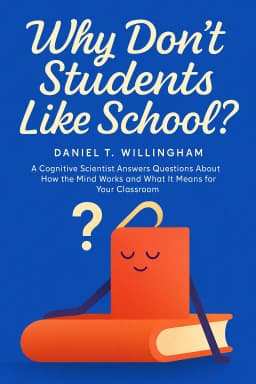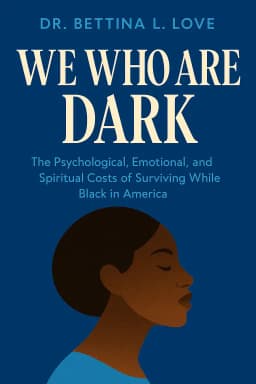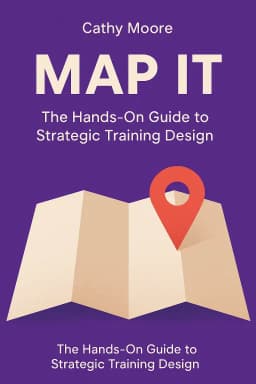
Rebooting the Classroom: A Cognitive Scientist's Blueprint for the Future of Learning
Golden Hook & Introduction
SECTION
Orion: Alex, we're in a strange moment for education. Student disengagement seems to be at an all-time high, and many people, students and parents alike, are questioning the very value of school. It’s a real crisis.
Alex Sarlin: It absolutely is, Orion. From a product perspective in EdTech, "engagement" is the metric we chase constantly. But it often feels like we're just treating symptoms, not the root cause. We add points, badges, leaderboards... but the fundamental problem of disinterest often remains.
Orion: Well, that's what makes the book we're discussing today, Daniel Willingham's "Why Don't Students Like School?", so powerful. It sidesteps the symptoms and goes right to the core with a provocative, almost heretical idea. What if the reason students don't like school is simpler and more biological than we think? What if it's because their brains... aren't actually designed for thinking?
Alex Sarlin: That’s a bold premise. It feels counterintuitive. School is supposed to be the one place dedicated to thinking. If our brains are wired against it, we’re fighting a losing battle from the start.
Orion: Exactly. And that's the puzzle Willingham invites us to solve. He argues that if we understand the brain's actual operating system, we can design learning experiences that work our cognitive nature, not against it. So today, we'll dive deep into this from two perspectives. First, we'll explore the brain's surprising love-hate relationship with thinking itself. Then, we'll dismantle the myth that facts are obsolete and show why knowledge is the true engine of higher-order skills.
Alex Sarlin: I'm in. This sounds like it gets to the very heart of the instructional design challenges we face every day. Let's unpack it.
Deep Dive into Core Topic 1: The Engagement Paradox
SECTION
Orion: Great. So let's start with that first principle: People are naturally curious, but we are not naturally good thinkers; unless the cognitive conditions are right, we will avoid thinking. Willingham's point is that true, effortful thinking—not the automatic stuff like walking or recognizing a friend—is slow, unreliable, and takes a ton of energy. Our brain’s default setting is to conserve that energy. It would rather rely on memory to guide our actions.
Alex Sarlin: That makes sense. We operate on autopilot most of the time. Think about driving a car. When you were first learning, every single action—checking the mirror, pressing the pedal, turning the wheel—required intense concentration. Now, you can do it while holding a conversation. Your brain has automated the process to save mental bandwidth.
Orion: Precisely. But here's the paradox. While our brains are lazy, they are also curious. We mental work, but only under specific conditions. We love the feeling of solving a problem. There's a little rush of dopamine, a sense of satisfaction, when we figure something out. The key is that the problem can't be too easy, because that's boring. And it can't be too hard, because that's frustrating. It has to be just right.
Alex Sarlin: The 'Goldilocks zone.' In game design and EdTech, we call this 'desirable difficulty.' It's the absolute sweet spot. If a level in a game is too easy, players get bored and quit. If it's impossible, they get frustrated and quit. The entire goal of a good adaptive learning system is to keep the user hovering right in that zone, constantly feeling challenged but capable.
Orion: And Willingham has a hilarious, and very human, story that illustrates what happens when you miss that zone. He talks about being a teenage boy in middle school, and the one day he was actually excited for class was the day they were having the sex education talk. You'd think that's a topic with guaranteed, built-in engagement for a room full of 13-year-olds.
Alex Sarlin: You would think. Zero marketing required for that topic.
Orion: Right? But the teacher presented it in such a dry, clinical, and boring way that despite the inherently fascinating subject matter, the entire class was completely disengaged. They were bored. The lesson wasn't framed as a problem to solve or a mystery to uncover; it was just a data dump. It proves that content alone is never enough. The cognitive conditions weren't right.
Alex Sarlin: That story is a perfect microcosm of the problem with so much of education, both traditional and digital. We think that if the information is important, students should just absorb it. But that's not how the brain works. The learning experience has to be designed as a compelling problem. Instead of a lecture on human sexuality, what if the question was, "You're a screenwriter for a TV show. How would you write a realistic and responsible scene about two teenagers navigating this situation?" Suddenly, it's not a lecture; it's a problem to solve. You've created the 'desirable difficulty.'
Orion: That's a brilliant re-framing. It shifts the student from a passive recipient to an active problem-solver. But to solve a problem like that, you need more than just a good prompt. You need raw material to work with.
Alex Sarlin: You need information. You need facts.
Orion: Exactly. And that brings us to the second, and perhaps more controversial, principle for today's education debates.
Deep Dive into Core Topic 2: The Bedrock of Brilliance
SECTION
Orion: The principle is this: Factual knowledge must precede skill. This flies in the face of a lot of modern educational philosophy, which often dismisses 'rote memorization' and prioritizes '21st-century skills' like critical thinking, collaboration, and creativity.
Alex Sarlin: Oh, this is a huge debate. The "skills versus knowledge" argument is constant. The prevailing wisdom in many tech circles is that knowledge is a commodity—you can just Google it. The real value is in knowing to think.
Orion: Willingham argues that's a fundamental misunderstanding of cognition. He says you can't think critically about a topic you know nothing about. Background knowledge isn't just a collection of trivia; it's the very framework that allows for higher-order thought. It provides vocabulary, it helps you 'chunk' information into meaningful patterns, and crucially, it frees up your limited working memory to actually instead of just trying to decode basic information.
Alex Sarlin: So, without the background knowledge, your brain is so busy just trying to understand the words and basic concepts that it has no space left over for analysis or creativity.
Orion: You've got it. And there's a landmark study he describes that makes this point in a way that is impossible to forget. Researchers in the 1980s wanted to test the role of background knowledge in reading comprehension. So they got a group of junior high students and divided them into four groups.
Alex Sarlin: Okay, what were the groups?
Orion: You had: 1. Good readers who knew a lot about baseball. 2. Good readers who knew very little about baseball. 3. Poor readers who knew a lot about baseball. 4. And poor readers who knew very little about baseball. The 'good' and 'poor' readers were determined by a standard reading comprehension test.
Alex Sarlin: I think I see where this is going.
Orion: They gave all the students a detailed passage describing a half-inning of a baseball game. It was full of terms like 'sacrifice fly,' 'the runner on third tagged up,' and 'the pitcher was trying to protect a one-run lead.' As the students read, they were periodically stopped and asked to move little figures on a model baseball diamond to show what was happening. The question was, who would understand the story better?
Alex Sarlin: The conventional wisdom says the good readers, of course. That’s what a reading test measures.
Orion: That’s what everyone thought. But the results were stunning. The single biggest predictor of comprehension was not general reading ability. It was how much the student knew about baseball. The 'poor readers' who were baseball fanatics dramatically outperformed the 'good readers' who knew nothing about the game. Their knowledge base allowed them to make sense of the text, to fill in the gaps, and to understand the story's meaning.
Alex Sarlin: Wow. That's not just an interesting finding; it's a powerful indictment of how we often design and assess learning. We create these 'skill-based' platforms or 'critical thinking' exercises, but if we don't first ensure the student has the underlying domain knowledge, we're setting them up to fail. We're asking them to comprehend a baseball game without knowing the rules.
Orion: And they just see a bunch of people in pajamas running around a field.
Alex Sarlin: Exactly. It makes me think about the immense challenge for EdTech. How do you assess that deep background knowledge at scale? A multiple-choice quiz can't capture it. It's a massive data and instructional design problem. A truly intelligent learning system wouldn't just teach a skill; it would first diagnose and, if necessary, build the requisite factual foundation before ever presenting the problem. That study shows that without that foundation, even a 'skilled' student is lost.
Synthesis & Takeaways
SECTION
Orion: So, when you put these two principles together, a clear picture emerges. Willingham is telling us that the path to engagement, the answer to 'Why don't students like school?', isn't about making things 'fun' in a superficial way. It's about, first, framing learning as a series of compelling, solvable problems that respect the brain's need for a 'just-right' challenge.
Alex Sarlin: And second, ensuring students have the rich, factual background knowledge required to even begin to tackle those problems. The pleasure of solving a problem is inaccessible if you don't have the tools to work on it. The two ideas are completely intertwined. You can't have one without the other.
Orion: It’s a powerful and practical framework. It moves us away from the unhelpful 'knowledge versus skills' debate and gives us a more integrated model for how learning actually happens.
Alex Sarlin: It really does. And it gives people in my field a much sharper lens to evaluate our own work. It boils down to a couple of core questions for any teacher, instructional designer, or product manager. When you look at a lesson, a textbook, or a piece of software, you have to go beyond the surface. Don't just ask, 'Is it engaging?' or 'Does it look cool?'
Orion: What should they ask instead?
Alex Sarlin: You have to ask, first: 'What is this activity making the student think about?' Are they thinking about the historical context of the Underground Railroad, or are they thinking about the right ratio of flour to shortening to bake a biscuit? And second, you have to ask: 'Do they have the necessary background knowledge to think about it successfully?' If we can get the answers to those two questions right, I think we can actually start to build the learning experiences of the future and begin to solve this crisis of engagement.
Orion: A perfect synthesis. Know what you want them to think about, and give them the tools to do it. Alex, thank you for bringing your perspective to this.
Alex Sarlin: My pleasure, Orion. This was a fantastic discussion.









